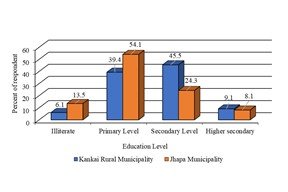Status of farm mechanization and its impact on maize production in Jhapa District, Nepal
DOI:
https://doi.org/10.26832/24566632.2021.060304Keywords:
Farm machineries, Mechanization, Maize production, ProductivityAbstract
A survey research was carried out in 2020 in maize zone, Jhapa to identify and analyze the status of farm mechanization and its impact in the maize production. Kankai Municipality and Jhapa Rural municipality were purposively selected for the study as these areas were under the command area of prime minister agriculture modernization project, project implementation unit, maize zone Jhapa. Thereafter, a total of 70 samples were selected using random sampling method. Thirty-three samples were selected from Kankai Municipality and remaining thirty-seven were selected from remaining Jhapa rural municipality. Primary data were collected using semi-structured questionnaire, focal group discussion and key informant interview whereas secondary data were obtained through a review of relevant literature. Both descriptive and analytical statistics were used to analyze the data. It was found that the status of mechanization was still in the initial phase in the study area. Results showed that mechanization was limited to two cultural operations namely tillage and threshing of which only in case of tillage, farm machineries were adopted by more than ninety percent of the respondent farmers while in case of sowing more than ninety percent of respondent didn’t use any modern equipment. Insect and pest in maize field was major problem faced by the farmers. Therefore, productivity of maize in Kankai area was higher as compared to Jhapa area as adoption of mechanization was higher in Kankai area.
Downloads
References
Barman, S., Deka, N., & Deka, P. (2019). Factors Affecting Farm Mechanization – A Case Study in Assam, India. Asian Journal of Agricultural Extension, Economics & Sociology, 32(1), 1–7, https://doi.org/10.9734/ajaees/2019/v32i130146
Dawadi, D., & Sah, S. (2012). Growth and yield of hybrid maize (Zea mays L.) in relation to planting density and nitrogen levels during winter season in Nepal. Tropical Agricultural Research, 23(3), 218, https://doi.org/10.4038/tar.v23i3.4659
Gauchan, D., & Shrestha, S. (2017). Agricultural and rural mechanisation in Nepal: Status, issues and options for future. In S. M. A. Mandal, B. S.D., & S. E. Justice (Eds.), Rural Mechanisation. A Driver in Agricultural Change and Rural Development. Institute for Inclusive Finance and Development (InM), (pp. 97–118).
K.C., G., Karki, T. B., Shrestha, J., & Achhami, B. B. (2015). Status and prospects of maize research in Nepal. Journal of Maize Research and Development, 1(1), 1–9, https://doi.org/10.3126/jmrd.v1i1.14239
Paudyal, K. R., Ransom, J. K., Rajbhandari, N. P., Adhikari, K., Gerpacio, R. V., & Pingali, P. L. (2001). Maize in Nepal: Production system, constraints, and priorities for research. CIMMYT,NARC, 1–56.
Poudel, S. K., & Paudyal, K. R. (2001). Impact of public-and private-sector maize breeding research in Nepal. In Impact of Public-and Private-sector Maize Breeding Research in Asia, 1966 -1997/98 (pp. 66–80). International Maize and Wheat Improvement Center (CIMMYT).
Ransom, J. K., Paudyal, K., & Adhikari, K. (2003). Adoption of improved maize varieties in the hills of Nepal. Agricultural Economics, 29(3), 299–305, https://doi.org/10.1016/S0169-5150(03)00057-4
Shrestha, A. K., Paudel, P., & Matsuoka, A. (2009). Socio-economic factor influencing adoption of fertilizer for maize production in Nepal. The 83rd Annual Conference of the Agricultural Economics Society, April.
Shrestha, S. (2012). Status of Agricultural Mechanization in Nepal. www.unapcaem.org
Verma, S. R. (2006). Impact of Agricultural Mechanization on Production, Productivity , Cropping Intensity Income Generation and Employment of Labour. In College of Agril. Engg., Punjab Agricultural University, Ludhiana.

Downloads
Published
How to Cite
Issue
Section
License
Copyright (c) 2021 Agriculture and Environmental Science Academy

This work is licensed under a Creative Commons Attribution-NonCommercial 4.0 International License.




